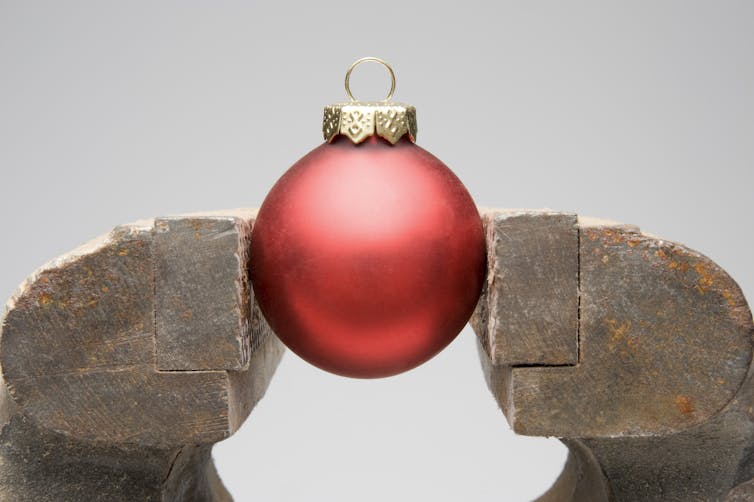How to deal with holiday stress, Danish-style
Denmark, despite its cold and gloomy winters, is full of people who consistently rank among the happiest in the world.

The holidays often involve jubilant gift exchanges, renewed connections with family and friends, and treasured traditions.
But the love and cheer can also be accompanied by a host of stressors – chaotic travel, conflicts over COVID-19 preventive measures, difficult dinner conversations with relatives, and worries about affording and finding holiday gifts.
This stress can worsen your mental and physical health. Research even finds that mortality is higher than normal during the holidays.
How can you best find a balance during the holidays so that you are fulfilled instead of frazzled?
Perhaps you can find balance by taking a few cultural cues from the Danes.
Denmark, despite its winters that can be cold and gloomy, is full of people who consistently rank among the happiest in the world.
As a native Dane and a psychologist, I’ll often point to Danish words that can cultivate well-being. These words can be used at any time of the year, but I think a couple are particularly useful for navigating the stress of the holidays.
Going above and beyond
Understanding the Danish word “overskud” can help you find more balance during a period of joy and competing commitments.
“Overskud” is a noun that roughly means “excess.” In an economic context it means profit, but in everyday speech it’s used to refer to having the energy, willingness or resources to tackle a task or a problem.
Having overskud is generally viewed as a good thing – you might go the extra mile at work, plan an elaborate holiday party, find extra thoughtful presents or volunteer at your child’s school.
Danes sometimes combine the noun with other nouns so that you might say that you can make an “overskuds-breakfast” – a fancy breakfast of omelettes, bacon, coffee and french toast. Or you might be an overskuds-dad – the dad who decorates cookies with his kids and their friends.
Although it might seem a bit like bragging to say one has overskud, Danes react to people describing having overskud with authentic applause and support. After all, who wouldn’t want to have extra energy and bandwidth to tackle life?
Some Danish therapists maintain that having more overskud can lead you to experience more contentment, calm and presence.
Your energy isn’t boundless
And yet the holidays can sometimes demand overskud in a number of different areas: Food should be healthy but also fit everyone’s preferences and expectations. Presents should be thoughtful and affordable. Elaborate decorations must come up and go down.
How do you balance it all?
Any psychologist will tell you that maintaining healthy boundaries is associated with better mental health.
Importantly, the word overskud is also used to clearly communicate when people cannot tackle an event, task or obligation.
Instead of saying “I’m swamped,” a Dane might say they don’t have enough “overskud” to go to a party or meet for a glass of gløgg, a mulled Christmas wine. It’s basically a shorthand way to say, in a nonjudgmental way, that something sounds like fun, and you would love to do it, but you simply don’t have the energy.
Danes also use a verb that’s related to overskud, which is a noun. They will say that they cannot “overskue” something – organizing a family holiday event, planning a trip or deep-cleaning the house.
Often, activities that are meant to be fun and invigorating, like going to a holiday party on a weeknight or buying presents for a fundraiser, still require a fair amount effort. If your store of energy is empty and you’d rather just stay home in your PJs, you might say “I just cannot overskue doing it.”
Essentially, the Danes use the words overskud and overskue to say, “No,” and there’s an unspoken understanding that it’s nothing personal. Saying “no” to some things will give you the time and energy to say “yes” to others, so you can tackle the holidays with vigor and cheer – and be that overskud party planner, cookie decorator or gift giver, should you wish to do so.
The importance of ‘pyt’
People might want their vision for the holidays to go off without a hitch. But reality often smacks people in the face: rude strangers, long lines, decoration disasters, out-of-stock toys, piles of dirty dishes, screaming children and resentful relatives.
You can practice letting go of holiday-related frustrations by simply saying the Danish word “pyt,” which is pronounced like “pid.”
Pyt is similar to saying “oh, well” or “stuff happens” and is used to let go of minor frustrations, hassles or mistakes. Danes might say about their own behavior “pyt, I didn’t do a great job wrapping that present.” Or they might say “pyt” when they sense someone else’s disappointment: “pyt, those cookies do look a bit funny, but they’re still delicious.”
Pyt is about accepting that things won’t go exactly as planned, and embracing that fact.

Having very high personal standards is a predictor of poor coping skills and a poor ability to deal with daily stressors. Moreover, stress can be mitigated by accepting imperfection as a healthy and normal part of life.
Another way to get to pyt is to focus on what really counts. Is this long line at the mall really worth ruining your day? Or is it a minor annoyance that will soon be forgotten?
Perhaps you can take a moment while waiting to think about some of the things you’re thankful for or remind yourself that you’re OK. Research shows that self-reflection and self-compassion together are particularly effective in reducing stress. Moreover, self-compassion can lead to acceptance of both your own and other people’s flaws.
One of the benefits of holiday stress – compared to unexpected stress – is that you can anticipate it.
You’ve been here before. If you don’t try to do it all and don’t expect everything to go according to plan, you may just end up having your best holiday yet.
Marie Helweg-Larsen does not work for, consult, own shares in or receive funding from any company or organization that would benefit from this article, and has disclosed no relevant affiliations beyond their academic appointment.
Read These Next
As war in Ukraine enters a 5th year, will the ‘Putin consensus’ among Russians hold?
Polling in Russia suggests strong support for President Vladimir Putin. Yet below the surface, popular…
Supreme Court rules against Trump’s emergency tariffs – but leaves key questions unanswered
The ruling strikes down most of the Trump administration’s current tariffs, with more limited options…
Colorado has high levels of radon, which can cause lung cancer – here’s how to lower your risk
Only 50% of Colorado homes have been tested for radon.






